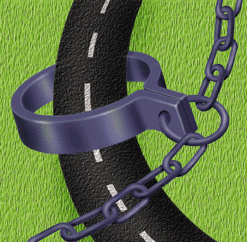
 The University of Chicago Magazine February 1996
The University of Chicago Magazine February 1996

There is a new roadside attrac- tion in Alabama. It's called the chain gang. Apparently this new attraction is very popular. Consider the comment of one spectator: "I love seeing 'em in chains. They ought to make them pick cotton."
The image of citizens hooting and hollering at shackled prisoners working along Alabama roads is discomforting enough. But even more so is the recent application of an Alabama businessman to register "Alabama Chain Gang" as a trademark for a distinctive line of apparel. Those passers-by who "love seeing 'em in chains" will be able to show their appreciation by donning special caps patterned on those worn by the prisoners, not to mention "chain earrings" and "chain bracelets."
The grim, racialized history of the chain gang cannot be separated from this entrepreneurial scheme. At the beginning of this century the chain gang was used to keep African Americans in servitude after Emancipation. Contract-enforcement laws-- directed primarily at African-American farm laborers--transformed contractual obligations into involuntary servitude by imposing criminal sanctions for a laborer's breach of an employment contract. These laborers had a choice: They could work out the contract or spend several months of forced, brutal labor on a chain gang, where death was not uncommon. The historical connection between chain gangs and slavery is well-entrenched in the minds of most Americans and probably all African Americans. For many, commercializing the chain gang is akin to commercializing slavery.
Trademark protection for "Alabama Chain Gang" is not inevitable. Trademark law allows the public to oppose the registration of marks that comprise "immoral" or "scandalous" matter. A Native-American group, for example, has instituted a proceeding to cancel the trademark registration for "Redskins" under this law. Those concerned about allowing a businessman to cater to the taste of some for degradation and bigotry should do the same.
Ironically, people offended by chain gangs are not the only potential opponents to the commercialization of its symbols. Some people believe that chain gangs deter crime. The argument is straightforward. Potential offenders will be less likely to commit crimes if they believe that public, shameful service is a likely consequence of their transgressions. The argument means, necessarily, that the effectiveness of chain gangs as deterrents is connected to a particular image of the chain gang. Preservation of this image depends on allowing a very limited group to wear chain-gang symbols--convicted criminals.
Marketing the "Alabama Chain Gang" will not preserve the special stigma of the chain gang. Instead, marketing will fragment its meaning. The argument that the symbolism of the American flag has been diluted through its placement on everything from blue-jeans pockets to condoms provides an analogy. Though the potential marketer of the chain-gang caps is convinced that they will remind the public of the consequences of crime, it is just as likely that some people (maybe young gang members) will buy the caps precisely because they connote deviance.
Still others will buy the caps. People who wish to exhibit solidarity with their brothers, sons, and friends will buy them. People who wish to protest chain gangs will buy them, too. Some will wear the caps simply because they think they look "cool." It is easy to see how the marketing process will assist diverse groups in attaching diverse meanings to an "Alabama Chain Gang" cap. These caps will come to represent everything from a badge of shame to a fashion statement.
Almost every group with an interest in preserving the current meaning of the chain gang will lose if "Alabama Chain Gang" is aggressively marketed. Those who desire to jeer at the shame of others will lose if chain-gang caps become fashionable. Law enforcement will lose for the same reason.
Most importantly, all Americans will lose a unique symbol of the troubled history of race relations in this country--a symbol from which we still have much to learn. When we think of the chain gang, there should be no ambiguity about what it represents.
Tracey Meares, JD'91, assistant professor at the University of Chicago Law School, specializes in the criminal-justice system and the relationship between law enforcement and poverty.